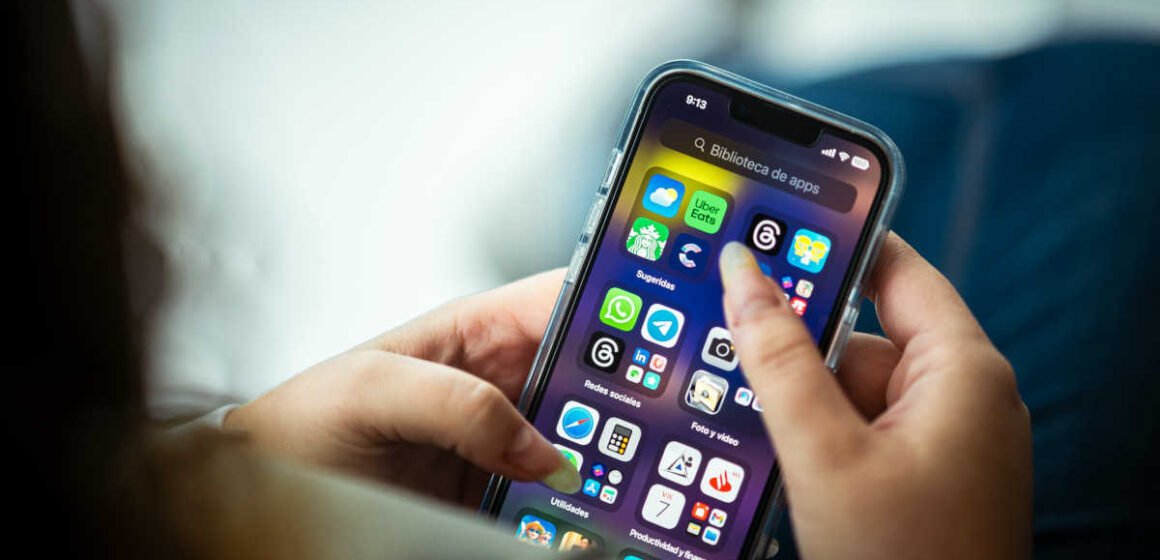The Latest Trends in Mental Health: Mobile Applications Take Center Stage
Navigating mental health can sometimes be difficult, especially in these uncertain times. A fact worth noting is that one of the fastest-growing categories during the COVID-19 pandemic was mental health apps.
This blog will delve into how these mobile applications have revolutionized the field of mental healthcare, addressing key benefits, potential drawbacks and future trends. You won’t want to miss this journey through a transformative landscape in modern wellness!
Key Takeaways
- Mental health apps are growing fast, especially during COVID-19. They help people with issues like ADHD, anxiety and depression.
- These apps are helpful 24/7. They can help people who might not have easy access to mental health resources or live in remote areas.
- Many mental health apps use evidence-based treatments that really work such as cognitive-behavioral therapy (CBT), dialectical behavior therapy (DBT), and mindfulness practices
- There can be some problems with these apps too. Some only focus on a few common disorders and may overlook conditions like bipolar disorder or post-traumatic stress disorders which need more attention.
- While the future of these mobile tools is bright due to technological advancements and increased collaboration with healthcare providers, concerns about privacy rules and safety regulations are being addressed for better user protection.
The Growing Popularity of Mental Health Apps
The trend of using mental health apps is seeing a significant boost, especially amid the COVID-19 pandemic. Different demographics are increasingly turning to these digital platforms for managing various mental conditions such as ADHD, anxiety, depression and more.
With these mobile technologies providing accessible tools and resources, it’s clear that the wave of mobile wellness applications has become transformative in this field.
During COVID-19
The COVID-19 pandemic has fueled a dramatic upswing in the use of mental health apps. With lockdowns and social distancing measures in place, access to traditional mental health resources became challenging, if not impossible for many.
Prompted by these abrupt changes, technology stepped up to fill this gap. Mental health apps experienced a surge becoming one of the fastest-growing categories during the pandemic.
These digital platforms provided accessible tools ranging from crisis intervention and prevention to diagnosis and management of various conditions including anxiety, depression, ADHD among others.
Users found solace in guided meditations and wellness exercises that these applications offered right at their fingertips, making self-care attainable even amidst global uncertainty.
Moreover, behavioral health apps had to pivot their advertising strategies swiftly to adapt to this changing landscape while focusing on user engagement issues as well. This marked rise suggests an undeniable value placed on mobile mental wellness resources during such unprecedented times.
Among Different Demographics
Young adults show a high usage rate of mental health apps. The conveniences offered by mental health technology seem to resonate with this age group as they often face challenges like anxiety, major depression and ADHD while transitioning into adulthood.
Mobile applications for mental health provide them accessible support services right at their fingertips.
On the other hand, older adults have shown increased interest in wellness apps too. Digital solutions for managing conditions such as bipolar disorder or posttraumatic stress disorders are making strides among seniors.
However, it’s important to point out that engagement issues remain a concern across all demographics when using mobile therapy tools consistently over time.
Benefits of Mental Health Apps
Mental health apps offer convenient 24/7 access to resources, extending reach to underrepresented groups while providing evidence-based treatments.
Convenient access to resources
Smartphone mental health tools and wellness apps provide instant, round-the-clock connection to helpful resources. They conveniently support people experiencing a broad range of disorders, from ADHD and major depression to anxiety and post-traumatic stress disorder.
Users can engage with guided meditations or access vital substance use disorder resources at any time they need assistance. The growing popularity of these digital solutions during the COVID-19 pandemic underlines this unmatched convenience, allowing users facing different emotional challenges to self-manage their symptoms more effectively than ever before.
Mobile technologies prove that essential mental health support is now just a click away for anyone with an internet-connected device.
Increased reach for underrepresented groups
Mobile mental health apps are expanding access to resources for underrepresented groups. This growth in digital mental health solutions empowers communities often overlooked by traditional healthcare systems.
Such populations include individuals living in remote areas, those with limited financial resources, and people facing cultural or language barriers. Mental health apps offer the potential to narrow this gap, providing tools like guided meditations and wellness strategies directly on smartphones.
They are also addressing prevalent disorders such as major depression, anxiety, bipolar disorder and post-traumatic stress disorders among these groups. Thus, mobile health (mHealth) is playing a pivotal role in democratizing mental healthcare by putting crucial support at everyone’s fingertips regardless of their geographic location or socio-economic status.
Evidence-based treatments
Many mental health apps now provide evidence-based treatments. These digital solutions often incorporate proven therapeutic techniques like cognitive-behavioral therapy (CBT), dialectical behavior therapy (DBT), and mindfulness practices into their design to treat conditions such as major depression, anxiety, bipolar disorder, posttraumatic stress disorders, and ADHD.
For instance, mobile app-based interventions for alleviating symptoms of depression have demonstrated significant results in several meta-analyses. Features like guided meditations and interactive modules help users manage their mental health outside traditional therapy settings.
Offering these evidence-based therapies via mobile technologies also increases access to care for underrepresented groups who may otherwise struggle to obtain the necessary resources.
Potential Pitfalls of Mental Health Apps
While mental health apps offer great potential in democratizing mental healthcare, they also face certain pitfalls. These include a narrow focus on specific disorders which may exclude individuals with less common or complex mental health conditions.
Additionally, the industry grapples with regulatory challenges as there aren’t comprehensive guidelines to govern the quality and effectiveness of these apps. Lastly, despite their growing popularity, these applications need better integration into traditional healthcare systems for optimum results and acceptance by professionals in the field.
Narrow focus on specific disorders
Mental health apps currently tend to concentrate on specific disorders only. Users often find beneficial tools for the most common mental health issues such as major depression, anxiety, or ADHD.
However, less prevalent but equally significant conditions like bipolar disorder and posttraumatic stress disorders are frequently overlooked. This narrow focus undermines the effectiveness of mobile applications for mental health as comprehensive digital solutions.
Further development and application of mental health apps need to cover a broader spectrum of diagnoses, including those related to pandemic-related substance use and other less recognized mental health problems.
Lack of regulations
In the bustling market of mental health apps, a significant concern centers on regulation. The rapid growth and development of digital mental health solutions often surpass existing regulatory structures.
This gap can leave users exposed to potential risks and misinformation. Some wellness apps may provide incorrect or harmful advice without scientific basis, while others could neglect user privacy rights.
App developers must prioritize adhering to ethical practices regarding data security and treatment recommendations. Equally important is the role of government bodies in ensuring proper standards are met to protect consumers in this emerging field of mobile mental health interventions.
With better regulations, these applications could more effectively serve as valuable resources for managing conditions such as major depression, anxiety, bipolar disorder, ADHD or substance use disorders among many others.
Need for integration into healthcare systems
Mental health apps often operate independent of conventional healthcare systems, creating a significant gap in patient treatment plans. Improved integration into existing healthcare frameworks can enhance the effectiveness of these digital tools and improve patient outcomes.
Healthcare providers could also use app data to monitor patients’ mental health progress more effectively over time. This approach not only provides real-time information on patient behavior but may also help detect patterns that might go unnoticed in traditional face-to-face therapy sessions.
Moreover, integrating these apps into mainstream medicine’s daily practice could reduce stigma associated with seeking mental health treatment while ensuring continuity of care for people living with mental disorders.
The Future of Mental Health Care Apps
Advances in technology are shaping the future of mental health apps, offering personalized treatments and increased collaboration with healthcare providers. Explore more to understand how these changes might impact mental health care in the near future.
Advances in technology for personalized treatment
Technological advancements are paving the way for mental health apps to provide personalized treatments. Machines learn from user interactions to suggest custom-tailored content, enhancing their efficacy in managing different types of disorders.
This innovation promises a significant transformation into how we approach mental health care.
These technological breakthroughs give rise to exciting features including crisis intervention, prevention strategies, and condition management capabilities. Machine learning also aids in developing symptom-alleviation methods specific to individual users’ needs – leading more people towards therapy.
Future developments expect an increased integration with healthcare providers, providing comprehensive treatment plans via digital platforms.
Increasing collaboration with healthcare providers
Healthcare providers and mental health apps are teaming up more than ever before. By bringing together the expertise of professionals and the accessibility of mobile technology, these collaborations aim to provide comprehensive mental health support.
Providers can use insights from app data to tailor treatments, while also referring patients to specific platforms for ongoing assistance between sessions. This blend not only improves therapy outcomes but also extends care beyond traditional boundaries.
Mobile applications hold potential for real-time patient engagement which places healthcare providers in a better position to monitor progress effectively. For instance, an app tracking mood changes can alert therapists about potential crises brewing with their clients.
Moreover, some hospitals have initiated integrating such apps into their system allowing seamless communication between doctors and patients. Utilizing this digital convenience under professional supervision enhances both treatment efficacy as well as users’ adherence rates.
Directions for future research on inclusivity and safety regulations
Research needs to focus on developing norms and standards for mental health apps that include everyone.
- Further exploration of the effectiveness of mental health apps across different demographics is important.
- Researchers need to study how one-size-fits-all apps can cater to a diverse user base.
- The development of safety regulations should be based on empirical data from use-cases.
- Guidelines pertaining to privacy and data protection must form an integral part of these regulations.
- Research on accessibility features in these applications can make them more user-friendly.
- Mental health apps must provide inclusive language options for wider reach and acceptance.
- Studies on integrating feedback loops within these applications can improve their efficacy and safety.
- Research should also explore the potential negative impacts of over-reliance on mobile applications for mental health.
- Regular audits of the apps by third – party entities could ensure adherence to regulatory guidelines.
- There is a need for more comprehensive research specific to sub – groups such as adolescents, racial and ethnic minorities, and LGBTQ+ individuals in relation to app usage and effects.
Conclusion
The surge in mental health apps is revolutionizing the way we approach psychological well-being, transforming smartphones into vital tools for self-care. These digital solutions offer numerous benefits and are poised to play a significant role in future healthcare strategies.
However, as they continue to rise in popularity, it’s crucial that users understand their limitations and ensure proper use for maximum benefit. The rapid advancements herald not just innovation on the horizon but also an opportunity for more personalized mental health treatment options than ever before.
FAQs
1. How are mobile applications influencing mental health care?
Mobile applications are making mental health care more accessible by providing resources, therapy options, and enabling users to monitor their own well-being.
2. Are these mental health apps effective?
Yes, many mental health apps have shown effectiveness in managing stress, anxiety, depression and promoting overall positive mental health.
3. Is it safe to use a mental health app?
While most apps employ privacy measures, you must ensure that the chosen app respects user data confidentiality before use.
4. Can these apps replace professional medical advice?
No, while helpful as an additional resource or for minor issues, these apps should not replace direct consultation with healthcare professionals for serious concerns.
5. Which type of people can benefit from such applications?
Anyone seeking assistance with their emotional wellbeing can benefit from these applications – particularly those with limited access to traditional healthcare services.

Dr. O “TheTeenDoc.” helps clinicians communicate better with their teen patients. She speaks, blogs www.TheTeenDoc.com, researches and consults on communicating with teens. She has written two e-books for parents and teens on communicating about the challenging subject of sexual health. You know, teens that bring chief complaints of belly pain, social crisis, emotional turmoil and obnoxious parents. Or, is it the parents with obnoxious teens? Sometimes she mixes that complaint up.
Dr. O speaks www.TheTeenDoc.com to and is consulted by clinicians who want advice managing difficult teen and teen-parent situations. These situations frustrate clinicians and slow down their clinics making them wonder if they’ll ever walk out the door for the day. Every day, in her own practice, Dr. O helps clinicians communicate better with teens and helping you is another level of reward. Her talks are fun and informative, and her delivery empowers clinicians to actually think teens are an awesome group to work with. Her energy about teens is contagious and has inspired her coaching clients to have less fear and more confidence with the teens in their panel. Her dedication to seeing you succeed with a group she is so passionate about is what makes Dr. O’s Lounge the place you want to be!
If you are a clinician that has teen’s in your practice, from pediatrics to internal medicine, the person with whom you need to connect is Dr. O “TheTeenDoc!” You can listen to a complimentary audio “The Art of Teen Medicine” and recommend her e-book “Are You Serious? It’s Just Sex!” to your patients. And while you’re there, become part of Dr.O’s Lounge.
Specialties: consulting, coaching, counseling, mental health, research, seminars, spanish, public speaker, teaching, communications between teens and adults



